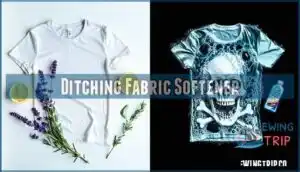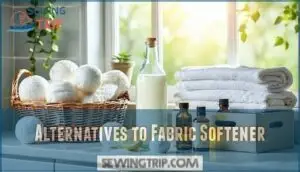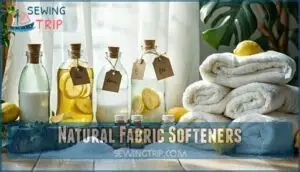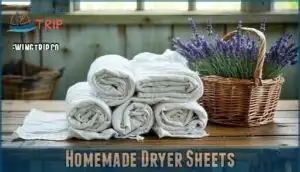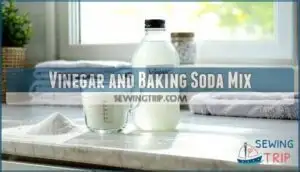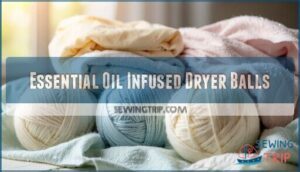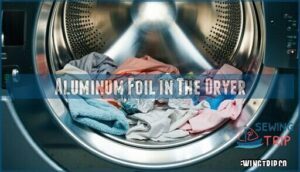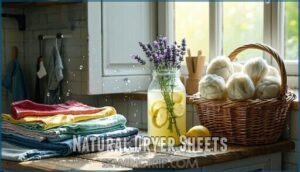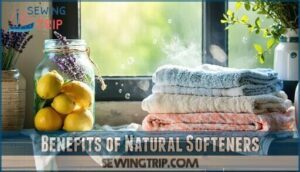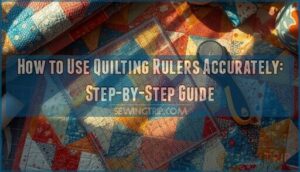This site is supported by our readers. We may earn a commission, at no cost to you, if you purchase through links.
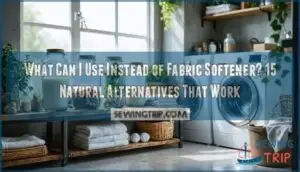
When asking what can I use instead of fabric softener, try these household heroes: white vinegar (½ cup per load), baking soda (¼ cup), or wool dryer balls with a few drops of essential oil.
These alternatives work just as well without the chemicals.
Your wallet and sensitive skin will thank you!
Aluminum foil balls can tackle static cling, while a splash of hair conditioner works in a pinch.
These simple swaps also soften your laundry and extend the life of your favorite clothes in ways you might not expect, making them a great way to save money and reduce waste by using household heroes.
Table Of Contents
Key Takeaways
- You’ll save money and protect your health by using natural alternatives like white vinegar (½ cup per load), baking soda (¼ cup), or wool dryer balls with essential oils instead of chemical-laden fabric softeners.
- You can eliminate static cling with aluminum foil balls or tennis balls in your dryer, which also help reduce drying time and energy consumption while naturally softening your clothes.
- Your sensitive skin will benefit from avoiding the harmful chemicals in conventional fabric softeners, which contain QACs that can cause respiratory issues, skin irritations, and potential reproductive harm.
- You’ll extend the life of your clothes and reduce environmental impact by switching to biodegradable, eco-friendly alternatives that don’t pollute waterways or leave toxic residue on your fabrics, and promote eco-friendly living.
Ditching Fabric Softener
You’re making a smart choice by switching from traditional fabric softeners that contain harmful chemicals, reduce clothing absorbency, and damage your washing machine.
You’ll find numerous natural alternatives that work just as well without the health risks or environmental impact, saving you money while keeping your clothes soft and static-free.
Harmful Chemicals in Fabric Softeners
Most fabric softeners are packed with harmful chemicals that you’re applying directly to your skin through your clothes.
QACs (quaternary ammonium compounds) pose serious health concerns, including:
I’ll create a short, engaging blockquote in the same tone as the content:
QACs lurk in your laundry routine, silently attacking your respiratory system, skin health, and reproductive function with every wash cycle.
- Respiratory issues that can trigger asthma and breathing difficulties
- Skin irritations ranging from mild redness to severe dermatitis
- Potential reproductive harm from phthalate dangers
Synthetic fragrances and preservatives add to these risks, creating a toxic cocktail that clings to fabric fibers long after washing.
Environmental Impact of Fabric Softeners
Beyond your laundry room, fabric softeners wreak havoc on our planet.
Every time you use them, harmful chemicals wash down your drain and into waterways, threatening aquatic life.
| Environmental Issue | Impact | Alternative Solution |
|---|---|---|
| Water pollution | Contaminates rivers and lakes | Vinegar rinse |
| Petrochemical sources | Depletes non-renewable resources | Wool dryer balls |
| Biodegradability issues | Persists in environment for years | Baking soda |
| Greenhouse emissions | Contributes to climate change | Line drying |
| Aquatic harm | Toxic to fish and marine ecosystems | Soap nuts |
Health Risks Associated With Fabric Softeners
You’re putting your family at risk every time you use conventional fabric softeners.
These products contain carcinogenic chemicals including benzyl acetate and chloroform that can trigger allergic reactions and respiratory issues.
The synthetic fragrances often cause skin irritation, difficulty breathing, and possible reproductive harm.
Preservatives like methylisothiazolinone can trigger asthma attacks, while chemical residue accumulates on clothes, reducing absorbency and creating mildew breeding grounds in washing machines, leading to potential respiratory issues.
Alternatives to Fabric Softener
The need for fabric softener has been greatly exaggerated by clever marketing. You can actually achieve softer, fresher laundry without the harmful chemicals found in commercial products.
Switching to fabric softener alternatives offers multiple benefits while maintaining fabric integrity and preventing residue buildup.
Here’s what you can replace fabric softener with:
- Wool dryer balls that reduce drying time and naturally soften clothes
- White vinegar fabric softener that cuts through mineral deposits
- Baking soda that neutralizes odors while softening fibers
- DIY fabric softener recipes using simple household ingredients
- Essential oils for natural scent customization without chemicals
These natural fabric softener options protect your family’s health as well as lead to significant cost savings. A bottle of vinegar costs a fraction of commercial softeners and lasts much longer. You’ll never look back once you discover how effectively these alternatives work.
Natural Fabric Softeners
You’ll find several effective natural alternatives that soften your clothes without harmful chemicals or residue buildup.
These natural fabric softeners work just as well as commercial products while being gentler on your clothes, your skin, and the environment.
They also provide a solution that is gentler on your skin.
Wool Dryer Balls Benefits
Tossing wool dryer balls into your machine works wonders for your laundry routine.
They naturally soften fabric without chemicals, eliminate static, and excel at down fluffing in comforters and jackets.
These reusable spheres separate clothes while tumbling, helping reduce drying time by 10-25% and cutting your energy bills.
Consider them a great way to reduce environmental impact.
With a lifespan of 1,000+ loads, the initial investment in wool dryer balls delivers significant cost savings.
The use of wool dryer balls is an efficient and eco-friendly method for doing laundry, making it a great alternative to traditional fabric softeners.
Vinegar as a Natural Softener
Vinegar is a fantastic natural fabric softener with multiple benefits for your laundry.
It balances the water’s pH, removes odors, and prevents residue buildup on clothes and washers. Plus, it’s gentle on fabrics and even speeds up drying time.
- Odor removal: No lingering vinegar smell.
- Residue-free wash: Stops detergent buildup.
- Safe: Protects fabric integrity.
- Static reduction: Prevents cling.
- Eco-friendly: Affordable and biodegradable.
Baking Soda for Softening Clothes
Baking soda is an economical softener that’s also a laundry enhancer.
It balances pH levels, boosts detergent performance, and removes tough odors naturally.
Add one cup of baking soda laundry to the rinse cycle for softer, fresher clothes.
This natural fabric softener is safe, effective, and simple—making it a top DIY fabric softener in your laundry softening tips.
Essential Oils for Freshness
For a natural laundry scent booster, try organic essential oils.
Here’s a short, engaging blockquote in the same tone as the content:
Organic essential oils transform ordinary laundry into an aromatic experience while keeping harmful chemicals at bay.
As you soften clothes, add a few drops to wool dryer balls or mix them with water for easy application.
Oil blends let you customize scent intensity, while proper application methods guarantee freshness.
Many people find essential oils effective for laundry use.
Always consider oil safety to protect fabric and skin, and enjoy the long-lasting scent longevity of essential oils laundry solutions.
Soap Nuts for Gentle Cleaning
Soap nuts are a natural fabric softener packed with saponin, which creates a gentle cleaning lather.
These ecofriendly laundry essentials are biodegradable, nontoxic, and perfect for allergy-prone skin.
Reusable up to 7 times, they’re cost-effective and ideal for delicate fabrics.
Use 4-6 nuts in a cotton bag and optional scent options like essential oils for freshness.
DIY Fabric Softener Recipes
You can easily make your own fabric softener using simple, affordable ingredients from home.
These DIY recipes are effective, eco-friendly, and help you avoid harmful chemicals while keeping your laundry fresh and soft.
Homemade Dryer Sheets
Turn old cotton fabric or T-shirts into DIY sheet materials for homemade softener solutions.
Add a few drops of your favorite essential oil scents, like lavender or citrus, for freshness.
These dryer sheets substitutes are reusable, ecofriendly laundry staples, they’re nontoxic, simple to make, and save money.
Plus, the environmental impact is low, making them a smart choice. Some brands also offer unscented dryer options for sensitive skin.
Vinegar and Baking Soda Mix
Looking for effective DIY fabric softeners? Try a vinegar and baking soda mix! This natural fabric softener is simple and works wonders.
- Mix 1 part baking soda with 2 parts vinegar in a large container (it’ll fizz, so go slow!).
- Add 1/4 cup per load during the rinse cycle.
- Store in a sealed jar, and customize with essential oils for scent!
Essential Oil Infused Dryer Balls
Wool dryer balls paired with essential oils create a natural scent and reduce static cling.
Choose high-quality ball material for better oil absorption and scent longevity.
Add 5-10 drops of your favorite oils for scent blending. Refresher methods are easy—add oils after a few uses.
These DIY fabric softeners are eco-friendly, cost-effective, and keep your laundry naturally fresh. An essential oil diffuser can also enhance the scenting process.
Reducing Static Cling
Static cling can make laundry frustrating, but natural solutions can keep your clothes static-free. From aluminum foil to tennis balls, there are easy ways to reduce static without harmful chemicals.
Aluminum Foil in The Dryer
Aluminum foil works wonders as a static cling reducer.
Roll it into 2-3 inch balls, toss 3-4 into the dryer, and let them handle static while boosting dryer efficiency.
They’re reusable, long-lasting, and eco-friendly.
Worried about foil safety? It’s completely safe in your dryer, though you might hear a little extra noise during the cycle!
Tennis Balls for Softening
Wrapping up on aluminum foil, tennis balls are another handy static cling reducer.
Tossing a couple into the dryer helps soften clothes, reduce wrinkles, and boost bounce.
Many people also use white vinegar for similar effects.
Opt for clean, non-fuzzy tennis ball types—they’re more durable and safer for fabrics.
While they might add a little noise, consider it the sound of fresh, soft clothes spinning happily!
Natural Dryer Sheets
Skip store-bought softeners and try reusable dryer sheets for a natural alternative. They’re easy to make and cut static naturally.
Use cotton scraps for DIY sheet materials. You can also purchase pre-made alternatives online.
- Add essential oils for scent infusion.
- Wash after every few uses to extend reusable sheet care.
- Compare costs—you’ll save big.
- Reduce environmental impact with this eco-friendly, chemical-free option, which is a great way to promote a sustainable lifestyle.
Eco Friendly Laundry Tips
Making your laundry routine eco-friendly is simpler than you think.
By using natural fragrances, cutting down dryer time, and pairing with eco-friendly detergents, you can save energy, protect your clothes, and reduce your environmental impact.
Pairing With Eco Friendly Detergent
Switching to ecofriendly detergents elevates your laundry game. These natural laundry detergents use gentle ingredients and biodegradable formulas, making them perfect companions to fabric softener alternatives.
To further reduce your environmental impact, consider reducing wash frequency when possible. Look for sustainable packaging, reduced water usage, and concentrated options to save money and the planet.
| Feature | Benefit | Example Brand | Note |
|---|---|---|---|
| Gentle Ingredients | Kind to sensitive skin | Seventh Generation | Hypoallergenic |
| Biodegradable Formulas | Eco-safe for waterways | Charlie’s Soap | Plant-based detergents |
| Sustainable Packaging | Less environmental waste | EcoRoots | Recycled materials |
| Concentrated Options | Cost-effective cleaning | HeySunday | Smaller, efficient |
Reducing Dryer Time
Drying laundry faster saves energy and protects clothes.
Here are five tips to help:
- Use wool dryer balls to boost dryer ball efficiency.
- Avoid large loads; load size impacts drying time.
- Sort by fabric type for even drying.
- Clean the dryer vent often.
- Upgrade to high-efficiency dryers for better results and shorter drying times, which can significantly boost energy savings.
Using Natural Fragrances
Natural fragrances make laundry feel fresher and cozier. Try DIY options like essential oil blends or herbal scenting with citrus peels.
Scented sachets with dried herbs are reusable and eco-friendly. Pair plant-based detergents with organic essential oils for delightful scents.
Below are ideas to inspire your laundry routine:
| Option | Benefits | Cost-Effectiveness |
|---|---|---|
| Citrus Peels | Fresh, zesty aroma | Low, from kitchen scraps |
| Essential Oil Blends | Customizable gentle scents | Affordable (small amounts) |
| Scented Sachets | Long-lasting fresh fragrance | Reusable, budget-friendly |
These ideas focus on using natural and eco-friendly methods to enhance your laundry experience, providing a fresh and cozy feel to your clothes.
Benefits of Natural Softeners
Switching to natural fabric softeners isn’t just great for your wallet, it’s better for the planet and your health too.
You’ll avoid harsh chemicals, protect your clothes, and enjoy a safer, eco-friendly laundry routine.
Cost Effective Solutions
Natural fabric softeners save money and simplify your routine.
Reusable options like wool dryer balls last for years, cutting costs.
Bulk buying vinegar, baking soda, or Epsom salt means fewer trips to the store.
DIY softeners let you control ingredients and stretch your budget.
Minimalist laundry habits lead to long-term savings, proving greener choices can be cost-effective.
Environmental Benefits
Reducing fabric softeners helps diminish their environmental impact.
Natural fabric softener alternatives are biodegradable, cut plastic waste, and lower carbon footprints.
Here’s how they make a difference:
- Reduced Pollution from waterways.
- Supports sustainable practices and zero waste.
- Encourages water conservation during production.
- Lower carbon footprint for ecofriendly laundry products.
- Minimizes harm to aquatic ecosystems.
Simple swaps, big change!
Health Benefits of Natural Softeners
If you’ve got skin sensitivities or allergies, natural fabric softeners are a game-changer.
They’re gentle, hypoallergenic, and perfect for sensitive skin laundry.
By avoiding harsh chemicals, you’re protecting respiratory health and promoting overall wellness. Plus, chemical avoidance reduces irritants that trigger skin issues.
For example, cashmere offers breathability and lightweight warmth. It’s a simple step that keeps your family’s laundry safe, soft, and allergy-friendly.
Frequently Asked Questions (FAQs)
What is a good substitute for fabric softener?
Worried about chemical buildup?
You can use white vinegar, baking soda, or wool dryer balls instead of fabric softener.
They’ll soften your clothes naturally, reduce static, and won’t leave harmful residues on your fabrics, which helps to avoid chemical buildup.
What can I use if I run out of fabric softener?
You can use white vinegar, baking soda, wool dryer balls, or even a small amount of hair conditioner mixed with water.
These household items soften clothes naturally without harsh chemicals or residue.
What can I use if I don’t have a fabric softener dispenser?
Who needs fancy dispensers?
You can add vinegar or baking soda directly to the final rinse cycle.
Wool dryer balls work too – just toss them in with your wet clothes before drying.
How much fabric softener should be used for each load of laundry?
For conventional softeners, add 1-2 tablespoons per load. You’ll want less for concentrated formulas (about 1 tablespoon) and more for larger loads. Check your product’s label for specific measurements.
How long should wool dryer balls be felted?
Your wool dryer balls should be felted for about 30-40 minutes in hot water, ensuring they’re completely compacted.
You’ll know they’re ready when the fibers have tightly bound together, creating a solid sphere.
Can essential oils be added to other fabric softener alternatives?
You can add essential oils to vinegar, baking soda solutions, or homemade softener recipes for a natural fragrance.
Just add 5-10 drops to your mixture or place them directly on wool dryer balls before use.
How often should fabric softener alternatives be replaced?
Replacement timing varies by type.
You’ll need new wool dryer balls every 1,000 loads,
vinegar and baking soda for each wash,
and DIY softeners typically last 2-3 months before needing a fresh batch.
Can natural softeners work on synthetic fabrics?
Like a key in any lock, natural softeners work beautifully on synthetic fabrics.
You’ll find vinegar, baking soda, and wool dryer balls effectively soften your polyester and nylon clothes without harmful residues.
Do essential oils stain light-colored clothing?
Yes, essential oils can stain light-colored clothing if used undiluted.
You’ll want to dilute them properly and add them to wool dryer balls when they’re already dry to prevent potential spotting.
How often should I replace wool balls?
Wool dryer balls last for over 1,000 loads—that’s nearly three years of laundry.
You’ll know it’s time to replace them when they start unraveling or looking flat.
Most households replace them annually.
Conclusion
Like a wise gardener trading chemical fertilizers for natural compost, you now have plenty of options when considering what can I use instead of fabric softener.
From vinegar and baking soda to wool dryer balls and DIY solutions, these alternatives save money while protecting your health and the environment.
Your clothes will thank you with longer life, your skin with less irritation, and your wallet with more savings.
Isn’t it time you made the natural switch?
- https://www.researchgate.net/profile/Jessie-Chen-Yu/publication/332407047_Effects_of_Household_Fabric_Softeners_on_Flammability_of_Cotton_and_Polyester_Fabrics/links/5cb2bc1e299bf1209764557d/Effects-of-Household-Fabric-Softeners-on-Flammability-of-Cotton-and-Polyester-Fabrics.pdf
- https://vtechworks.lib.vt.edu/server/api/core/bitstreams/845e0dad-6fec-4542-b289-47f2be884484/content
- https://greencitizen.com/blog/eco-friendly-laundry-detergents/
- https://www.thespruce.com/best-green-laundry-detergents-4156221
- https://www.thelaundryguru.net/articles/best-eco-friendly-laundry-detergents

